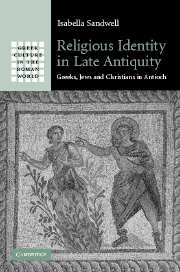Book contents
- Frontmatter
- Contents
- Preface
- List of abbreviations
- Part I INTRODUCTION
- Part II CONSTRUCTED AND STRATEGIC RELIGIOUS IDENTITIES AND ALLEGIANCES
- Part III RELIGIOUS IDENTITIES AND OTHER FORMS OF SOCIAL IDENTIFICATION
- Chapter 5 Religious identity and other social identities in Chrysostom
- Chapter 6 Religious allegiance and other social identities in Libanius
- Part IV RELIGIOUS IDENTITY AND SOCIAL ORGANIZATION
- Part V ASSESSING THE IMPACT OF CONSTRUCTIONS OF IDENTITY
- Bibliography
- Index
Chapter 6 - Religious allegiance and other social identities in Libanius
Published online by Cambridge University Press: 22 September 2009
- Frontmatter
- Contents
- Preface
- List of abbreviations
- Part I INTRODUCTION
- Part II CONSTRUCTED AND STRATEGIC RELIGIOUS IDENTITIES AND ALLEGIANCES
- Part III RELIGIOUS IDENTITIES AND OTHER FORMS OF SOCIAL IDENTIFICATION
- Chapter 5 Religious identity and other social identities in Chrysostom
- Chapter 6 Religious allegiance and other social identities in Libanius
- Part IV RELIGIOUS IDENTITY AND SOCIAL ORGANIZATION
- Part V ASSESSING THE IMPACT OF CONSTRUCTIONS OF IDENTITY
- Bibliography
- Index
Summary
RELIGIOUS ALLEGIANCE AND THE POLITICAL SPHERE
The religious and the political spheres were traditionally inseparable in the Graeco-Roman world. Good functioning of religion was seen as indispensable for good functioning of the state, and dysfunction in the state was seen as a religious problem too. Political allegiance to the state was often simultaneously religious allegiance to the gods of the state and the divine person of the emperor. It is not surprising that we see this attitude in some of Libanius' writing about the fourth century. He eulogized the emperor Julian's rule as divinely ordained and as exemplifying the ‘correct relationship between gods and empire’ and praised his restoration of blood sacrifice as beneficial to the whole world. When Julian died, possibly murdered, Libanius could then blame all the woes of the Roman empire on this event (Oration 24 On Avenging Julian (of 378)). In the 380s Libanius could continue to exploit these traditional ideas such as when he attributes Roman success in conquest to worship of the gods (Or. 30.5 and 33 (F.iii.90 and 104–5)). On other occasions he could express very similar views about Christian emperors: in his oration In Praise of Constans and Constantius he praises the rule of Constantius as having divine favour and being divinely inspired: ‘the reigns of the present empire lie in the hand of the power above …’ (Or. 59.48 (F.iv.232)). He could also praise Theodosius and his rule as divine in nature.
- Type
- Chapter
- Information
- Religious Identity in Late AntiquityGreeks, Jews and Christians in Antioch, pp. 154 - 180Publisher: Cambridge University PressPrint publication year: 2007



